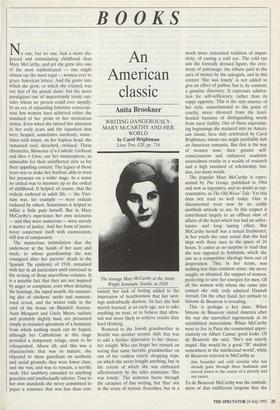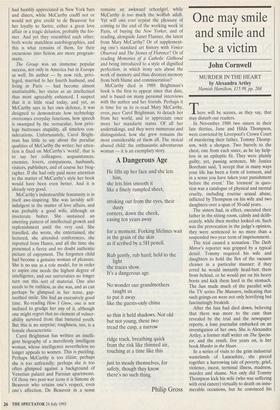BOOKS
An American classic
Anita Brookner
WRITING DANGEROUSLY: MARY MCCARTHY AND HER WORLD by Carol Brightman Lime Tree, £20, pp. 714 No one, but no one, had a more dis- graced and intimidating childhood than Mary McCarthy, and yet she grew into one of the most sophisticated — one might almost say the most regal — women ever to grace American letters. And the genre into which she grew, or which she created, was not that of the grande dame, but the more prestigious one of imperviously ironic out- sider whom no person could ever mystify. In an era of expanding feminine conscious- ness few women have achieved either the standard of her prose or her meticulous syntax. Even when she turned her attention to her early years and the injustices that were heaped, sometimes carelessly, some- times with intent, on her hapless head, she remained cool, detached, civilised. These chronicles, Memories of a Catholic Girlhood and How I Grew, are her masterpieces, as admirable for their uninflected style as for their appalling content. The legacy of those years was to make her fearless, able to trust her presence on a wider stage. In a sense no ordeal was to measure up to the ordeal of childhood. It helped, of course, that the ordeals endured in adult life — the Viet- nam war, for example — were ordeals endured by others. Sometimes it helped to inflict a little pain herself. But in Mary McCarthy's experience her own strictures — and they were numerous — were merely a matter of justice. And her form of justice never concerned itself with exoneration, still less of compassion.
The mysterious intimidation that she underwent at the hands of her aunt and uncle, to whose guardianship she was consigned after her parents' death in the Spanish 'flu epidemic of 1918, remained with her in all particulars until exorcised in the writing of those marvellous volumes. It is a notable fact that they are not inspired by anger or complaint, even when detailing the beatings, the taped mouth, the nauseat- ing diet of chickens' necks and unmoist- ened cereal, and the winter exile to the yard of the house on Blaisdell Avenue. Aunt Margaret and Uncle Myers, sadistic and probably slightly mad, are presented simply as rounded specimens of a humanity from which nothing much can be hoped, although her Catholicism at this stage provided a temporary refuge, soon to be relinquished. Above all, and this was a characteristic that was to mature, she objected to these guardians on aesthetic and social grounds: they were lower class, and she was, and was to remain, a terrific snob. Her snobbery extended to anything graceless and intellectually inferior. True to her own standards she never committed to paper a sentence that was less than con- The teenage Mary McCarthy at the Annie Wright Seminary, Seattle, in 1928 tained; her lack of feeling added to the impression of heartlessness that her writ- ings undoubtedly disclose. In fact she had merely learned, at an early age, not to take anything on trust, or to believe that altru- ism was more likely to achieve results than hard thinking.
Removal to the Jewish grandmother in Seattle was another seismic shift that was to add a further dimension to her charac- ter: insight. Who can forget her remark on seeing that same hieratic grandmother on one of her endless stately shopping trips, on which she never bought anything, but in the course of which she was embraced affectionately by the sales assistants: 'She was lonely.' The sentence burns through the carapace of fine writing, but 'fine' not in the sense of stylistic flourishes, but in a much more restrained tradition of impas- sivity, of casting a cold eye. The cold eye saw the formally dressed figure, the cere- mony of patronage, the tribute paid to the aura of money by the salesgirls, and in this context 'She was lonely' is not added to give an effect of pathos, but is, by contrast, a genuine discovery. It expresses admira- tion for self-sufficiency, rather than its soppy opposite. This is the very essence of her style, unsentimental to the point of cruelty, never divorced from the level- headed business of distinguishing worth from mere futility. Out of these unpromis- ing beginnings she matured into an Ameri- can classic, here duly celebrated by Carol Brightman, whom one might justifiably dub an American romantic. But that is the way of women now; their greater self- consciousness and enhanced academic assuredness results in a wealth of research and a high standard of scholarship, but, alas, too many words.
The popular Mary McCarthy is repre- sented by The Group, published in 1964 and now as legendary, and no doubt as rep- resentative, as The Old Wives' Tale. Yet this does not read so well today. One is disconcerted even now by its coldly snobbish attitude to sex. In this respect it contributed largely to an offbeat view of affairs of the heart which has had an unfor- tunate and long lasting effect. But McCarthy herself was a sexual freebooter; in her youth she once noted that she had slept with three men in the space of 24 hours. It comes as no surprise to read that she was opposed to feminism, which she saw as a competitive ideology born out of desperation. This, in her terms, was nothing less than common sense: she never sought, or obtained, the support of women, preferring to save her energies for men. Of all the women with whom she came into contact she only truly admired Hannah Arendt. On the other hand, her attitude to Simone de Beauvoir is revealing.
This is perhaps a key issue. When Simone de Beauvoir visited America after the war she marvelled ingenuously at its uninhibited materialism. When McCarthy went to live in Paris she commented appre- ciatively on Albert Camus' good looks. Of de Beauvoir she said, 'She's not utterly stupid. She would be a good "B" student somewhere in the intellectual world', while de Beauvoir referred to McCarthy as
that beautiful and cold novelist who has already gone through three husbands and several lovers in the course of a cleverly laid out career.
To de Beauvoir McCarthy was the embodi- ment of that indifferent largesse that she had humbly appreciated in New York bars and diners, while McCarthy coutd not or would not give credit to de Beauvoir for her loyalty to Sartre, either a great love affair or a tragic delusion, probably the for- mer. And yet they resembled each other; both wrote matchless autobiographies, and this is what remains of them, for their excursions into fiction are more program- matic.
The Group was an immense popular success, not only in America but in Europe as well. Its author — by now rich, privi- leged, married to her fourth husband, and living in Paris — had become almost unattainable, her status as an intellectual thus most agreeably enhanced. I suspect that it is little read today, and yet, as McCarthy says in her own defence, it was designed to demonstrate how technology overcomes everyday functions, how speech is swamped by the vernacular, how privi- lege buttresses stupidity, all timeless con- siderations. Unfortunately, Carol Bright- man has little to say about the peculiar qualities of McCarthy the writer; her atten- tion is fixed on McCarthy's 'world', that is to say her colleagues, acquaintances, enemies, lovers, companions, husbands, visitors, publishers, and of course her biog- rapher. If she had only paid more attention to the matter of McCarthy's style her book would have been even better. And it is already very good.
McCarthy's indestructible femininity is in itself awe-inspiring. She was lavishly self- indulgent in the matter of love affairs, and was probably a good wife, although an inveterate bolter. She sustained an unerring pattern of intellectual growth and replenishment until the very end. She travelled, she wrote, she entertained, she lectured, she attended conferences, she reported from Hanoi, and all the time she presented a fierce and no doubt authentic picture of enjoyment. The forgotten child had become a genuine woman of pleasure. She is no use as a role model, for in order to aspire one needs the highest degree of intelligence, and our universities no longer turn out this sort of material. One also needs to be ruthless, as she was, and as can perhaps be glimpsed in her tense, gap- toothed smile. She had an excessively good time. Re-reading How I Grew, one is not inclined to grudge her any of it, although one might regret that no element of vulner- ability survived from that battered youth. But this is no surprise; toughness, too, is a female characteristic.
Carol Brightman has written an intelli- gent biography of a mercilessly intelligent woman, whose intelligence nevertheless no longer appeals to women. This is puzzling. Perhaps McCarthy is too elitist; perhaps she is too unfriendly; perhaps she is too often glimpsed against a background of Venetian palazzi and Parisian apartments. Of those two post-war icons it is Simone de Beauvoir who retains one's respect, even one's affection. De Beauvoir in a sense
remains an awkward schoolgirl, while McCarthy is too much the wolfish adult. Yet will one ever repeat the pleasure of coming to the end of the working week in Paris, of buying the New Yorker, and of reading, alongside Janet Flanner, the latest from Mary McCarthy? Or of supplement- ing one's standard art history with Venice Observed and The Stones of Florence? Or of reading Memories of a Catholic Girlhood and being introduced to a style of dignified perfection, in which irony sets about the work of memory and thus divorces memory from both blame and commiseration?
McCarthy died in 1989. Brightman's book is the first to appear since that date, and is based on many personal interviews with the author and her friends. Perhaps it is time for us to re-read Mary McCarthy, even, pace Carol Brightman, to detach her from her world, and to appreciate once more her mandarin status. Of all her undertakings, and they were numerous and distinguished, how she grew remains the most considerable of them all. The stoical abused child: the enthusiastic adventurous woman — it is an exemplary story.



















































 Previous page
Previous page